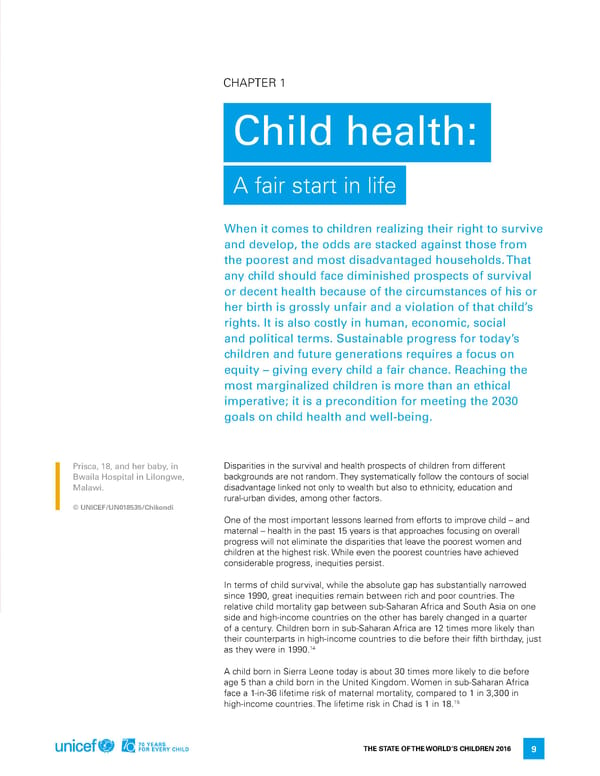ChaPTer 1 Child health: a fair start in life When it comes to children realizing their right to survive and develop, the odds are stacked against those from the poorest and most disadvantaged households. That any child should face diminished prospects of survival or decent health because of the circumstances of his or her birth is grossly unfair and a violation of that child’s rights. It is also costly in human, economic, social and political terms. Sustainable progress for today’s children and future generations requires a focus on equity – giving every child a fair chance. Reaching the most marginalized children is more than an ethical imperative; it is a precondition for meeting the 2030 goals on child health and well-being. Prisca, 18, and her baby, in disparities in the survival and health prospects of children from different Bwaila Hospital in Lilongwe, backgrounds are not random. They systematically follow the contours of social Malawi. disadvantage linked not only to wealth but also to ethnicity, education and rural-urban divides, among other factors. © UNICEF/UN018535/Chikondi one of the most important lessons learned from efforts to improve child – and maternal – health in the past 15 years is that approaches focusing on overall progress will not eliminate the disparities that leave the poorest women and children at the highest risk. While even the poorest countries have achieved considerable progress, inequities persist. in terms of child survival, while the absolute gap has substantially narrowed since 1990, great inequities remain between rich and poor countries. The relative child mortality gap between sub-Saharan africa and South asia on one side and high-income countries on the other has barely changed in a quarter of a century. Children born in sub-Saharan africa are 12 times more likely than their counterparts in high-income countries to die before their fifth birthday, just 14 as they were in 1990. a child born in Sierra leone today is about 30 times more likely to die before age 5 than a child born in the United Kingdom. Women in sub-Saharan africa face a 1-in-36 lifetime risk of maternal mortality, compared to 1 in 3,300 in 15 high-income countries. The lifetime risk in Chad is 1 in 18. The STaTe of The World’S Children 2016 9
 70 Years for Every Child Page 23 Page 25
70 Years for Every Child Page 23 Page 25